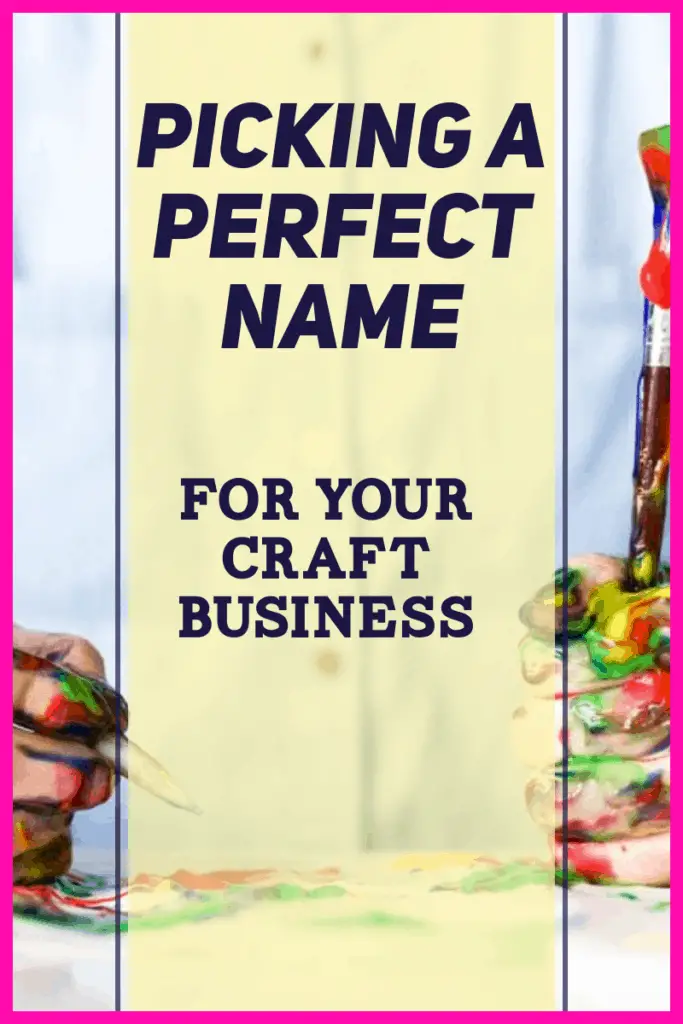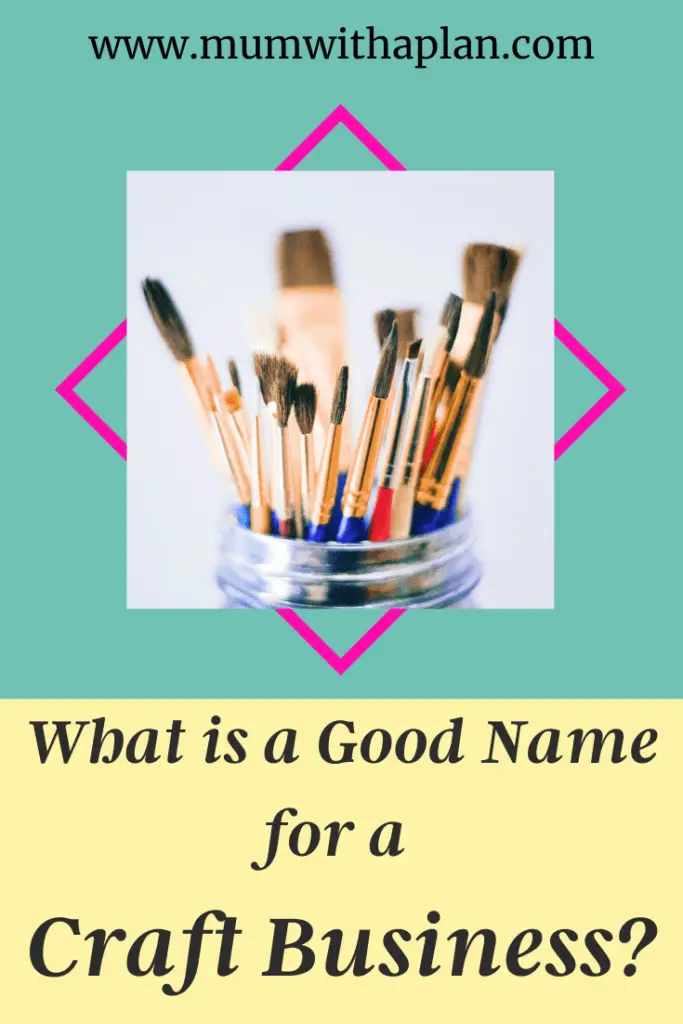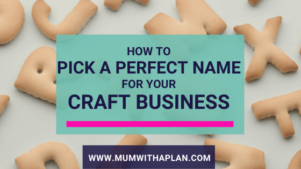Last Updated on 6th August 2021 by Allison
One of the first, and most important things you need to do when starting your own craft business, is to choose a good name. This is very important. After all, it will be your identity for hopefully many years to come. It is also the first impression potential customers get when interacting with your business.

How To Choose a Good Name for your Craft Business.
1-Know what your business is going to be.
Firstly, make sure you know exactly what niche you will be focusing on. You need to find a name to fit your business, not a business to fit an amazing name you have thought of.
RELATED POSTS:
BEGINNER’S GUIDE TO CHOOSING A CREATIVE NICHE
HOW TO START A CRAFT BUSINESS IN THE UK
WHY I STARTED MY OWN CREATIVE BUSINESS
This is important as it will form your brand identity moving forward. If you are planning on covering a few niches, or are looking at branching out to something new as you learn a new skill, you need to take this into consideration with your name.
It is best to have your business name set in stone from the beginning. It is possible to change your business name in the future, but I would highly advise against it as it is a right pain to do it properly!
2-Brainstorm some ideas.
Do you want your business name to reflect what it is you will be selling? for example, jewellery?
How about an alliteration? Connie’s Candles, Harriet’s Hats or Potty Pottery? Alliteration names can be easy to remember.
You may want to use just your name? This is a good idea if you ever need to change direction with what you sell. This option is always popular with artists.
Maybe something personal to you? You could name your business after your children or your pets.
You could pick something completely random, yet memorable. One way of doing this is to start a list of random words that you like the sound of or they mean something personally to you. You could also ask some friends or family members to give you a random word, add them to your list, and then see if you get any inspiration from it.
You may want to opt for a pun or something amusing. This tends to make your business name more memorable for potential customers. The best way to come up with ideas for this is to write down any phrases or sayings related to what your niche is, then see if you can tweak any to make it relevant for your business.
Here are a few good examples of this:
- Abra Kebabra – kebab shop
- Planet of the Grapes – wine bar
- Flat Boy Skim – plasterer
- Plaice Station – fish and chip shop
- The Codfather – another fish and chip shop
These are all legitimate businesses in the UK, and I am sure you will agree that they are all memorable!
One very popular, and very amusing way of coming up with a good name is by naming it after a famous person-but with a twist. I have seen many of these over the years and not only do they make me laugh, I always remember their business name and what they sell!
Here are a few of my favourites:
- Surelock Holmes – locksmiths
- Floral and Hardy – florists
- Jean Claude Van Man – removal company
- Bread Pitt – bakery
- Samuel ‘L’ Jackson – driving instructor
- Alan Cartridge – office supplies
I named my fabric business Dog Cotton, after a character in a soap opera in the UK (Dot Cotton in Eastenders).
Having a witty or quirky name for your business can be very worthwhile. It makes your business stand out and you can convey a sense of personality to your potential customers.
If you are still struggling to come up with anything, Spotify has a free business name generator if you are stuck for ideas:
Spotify Free Business Name Generator
You do NOT want to do the following:
Avoid using words that are hard to spell. If there are difficult spellings in your website address, people may have trouble finding it. People won’t land on your website if it’s nearly spelt right.
Don’t use crazy weird spellings as it will make you harder to find online, and you will need to keep on spelling your website address out so people know the correct spelling. This could put potential customers off if they think you can’t spell properly as well.
Stay away from hyphens! It’s difficult to tell people what your website is if you have to say ‘hyphen’ after every word.
Don’t make your business name really long. Anything up to about 12 letters is fine. A shorter businesss name is always easier to remember.
3-Come up with a shortlist.
Once you have a list of potential business names, it’s time to narrow them down to a few favourites. Pick 3 or 4 that you would happily have as your name.
You could now benefit from some feedback from friends and family to see if there is a clear favourite among them. A good way to do this is by doing a Facebook poll to see how many votes each name gets. I did this with Dog Cotton and over 80% of the people who voted picked this name. It was a bonus as this was my personal favourite anyway.
4-Research your favourite.
Once you have decided on your favourite name, you now need to do some research to make sure nobody else has it.
One very simple, but fairly important thing to do is write your potential business name as one word-like you would see it as a social media handle. The purpose of this is to make sure it doesn’t spell anything ‘unwanted’ when put together. One example I have seen recently of this is a business called Amy’s Lashes. It’s a beauty salon. Unfortunately, when put together for their social media account, @amyslashes makes it look a little bit sinister!
There is a really helpful website called namechk.com. All you need to do is put your shortlisted business names into their search engine, and they will tell you if your name is being used as a website, or is already being used on social media. If your idea is already are taken by a domain, and all the biggest social media platforms, you need to sadly forget about it.
Whatever you do, DO NOT change it to something very similar. It’s not cool. It won’t do you any favours and could inadvertently drive people to the other business by accident.
Now you have seen on namechk.com if the domain name you want is being used or not, go to GoDaddy.com to find out how much it will cost. When I was picking a name for this blog, I had a few genius ideas that I got really excited about. When I went to check if they were available, they were, but they would have cost me thousands of pounds!
If the domain you want is free, you don’t have to sell a child to pay for it, and the social media handles are also available, you need to snap it up as quickly as possible. Do this before you start announcing your new craft business name to the world. The domains are usually cheaper if bought for 2 years. You would also be best looking at any variations of your domain name and consider buying those as well, for example, you may want .com, but also buy .co.uk, .net, and .blog. I have been caught out by this in the past. My very first website was selling charm jewellery, and it was called Charmed by Allison. I bought .co.uk as at the time, I didn’t understand the importance of taking the .com as well.
In hindsight, I should never have used Allison as part of my business name because my name has 2 ‘L’s in Allison and EVERYBODY in the UK spells my name wrong. For some unknown reason, my mother decided to give me the American spelling of the name (I could never find my name on anything personalised growing up. I’m still bitter about it).
A few months into my business, a woman in America bought charmedbyalison.com which was bad enough, but she then proceeded to copy most of my website! I had started to host children’s jewellery making parties. She started doing the same a few months later and had basically copied and pasted my party information. I was fuming!! She also bought charmedbyallison.com which I should have bought in the first place. She spelt her name with 2 ‘L’s as well so must have wanted my domain, saw it wasn’t available, and so changed it slightly to fit.
Once you have grabbed everything you need, in the way of domains and social media handles. You can now move on to the next part of starting a business, which is to come up with a logo and some branding.
What is your craft business name? How did you end up deciding on the name for your business? Have you seen any funny ones about that you would care to share? Let me know in the comments below!




I organize various crafts within a small country community run village shop, having 10 other crafters besides myself who contribute. The shop have been advised by the accountant that we should really be puttering 40% on our goods because the shop is likely to breach the VAT threshold. Most of the crafters have said as their goods are low cost, they couldn’t possible put 40% on their prices as no one would buy. The arrangement is that the crafter’s currently have to work a four hour shift as a volunteer too, as it is a community run convenience shop as well. Can you advise if it’s worth setting up a separate business for the crafters please and how would I go about it?
So sorry for the delay in replying. It may be better if the crafters just pay to rent the space and then whatever they sell is through their own little business rather than through the shop?